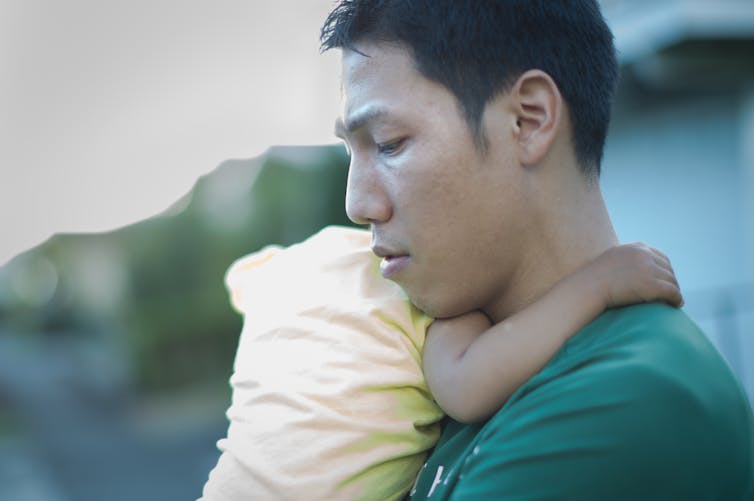Dr Andy Mayers writes for The Conversation about how postnatal depression can affect new fathers…
Postnatal depression: what new fathers need to know – and how to ask for help

christinarosepix/ Shutterstock
Andrew Mayers, Bournemouth University
Many people think of postnatal depression as a condition that only affects women. But in reality, postnatal depression affects almost as many men as women – with some research estimating it occurs in up to 10% of fathers.
Yet despite how common postnatal depression may be in men, there still isn’t very much information out there about it. This can make it hard to know if you may have postnatal depression – and how to get help if you do.
Here’s what you need to know.

This article is part of Quarter Life, a series about issues affecting those of us in our twenties and thirties. From the challenges of beginning a career and taking care of our mental health, to the excitement of starting a family, adopting a pet or just making friends as an adult. The articles in this series explore the questions and bring answers as we navigate this turbulent period of life.
You may be interested in:
‘He is always there to listen’: friendships between young men are more than just beers and banter
Body image issues affect close to 40% of men – but many don’t get the support they need
Why it happens
There are many reasons why postnatal depression happens. And, contrary to popular belief, it isn’t just due to hormones. Even in women, hormones only play a small role in postnatal depression.
Instead, postnatal depression is typically due to a combination of risk factors – such as a previous history of depression, sleep problems after the baby is born, lack of social support or financial challenges. Postnatal depression can also happen at any age.
The symptoms of postnatal depression are quite similar to symptoms of depression. As such, symptoms of postnatal depression may include low mood, lack of motivation, poor sleep, feeling guilty or worthless, poor concentration, changes in appetite or weight, fatigue and thoughts of death or suicide.
The main difference between depression and postnatal depression is that these feelings tend to happen in the postnatal period (typically the first year or so after the baby is born).
It can be normal to struggle with your mental health somewhat after your baby is born. After all, it can be an overwhelming and emotional time, with nearly every aspect of your life changing – from your daily routine, your relationship with your partner, to the amount of sleep you get every night.

fizkes/ Shutterstock
But if you’ve been experiencing low mood and lack of motivation for more than a few weeks, and are finding these feelings are making it difficult to engage with your infant, you may want to consider speaking with your GP or a mental health professional. It’s also worth noting that postnatal depression can happen at any time in the first year or two after the baby is born – not just in the early months.
Getting help
Postnatal depression is not likely to go away on its own. If you suspect you may be struggling with postnatal depression, it’s important to seek support – not only for your wellbeing, but because postnatal depression can also affect your bond with your baby.
First of all, there’s nothing wrong with needing help, and seeking support – either from loved ones, friends or a doctor – is nothing to be embarrassed by.It does not make you weak, nor does experiencing postnatal depression make you a “failure”.
While it can be difficult to know how to take the first step in getting support, a good starting point is simply acknowledging that this is a difficult thing to talk about. As simple as this sounds, it may just help you feel less awkward about sharing your experiences when you do speak to someone. It’s also worth remembering that when you do speak to someone, it’s important to say how you really feel – not what you feel you should say.
It’s also normal if you feel angry about feeling the way you do. Many young men who struggle with their mental health feel angry that they feel this way, or worry that they’ve let their loved ones down or that the system will not listen to them. To deal with that anger, be patient. Try to let the anger go – it may help you feel more at ease opening up about your other emotions.
You may also find it easier to talk about your experiences in certain settings. For example, while some people may find it easier to speak with their GP or in online chat groups, you may find it more comfortable to speak up in a less formal setting – such as while watching sports with friends. You can begin this conversation with something as simple as asking how others are doing, before sharing your own feelings and experiences. Or, if your friends are also parents themselves, you might ask if any of them experienced similar feelings during the postnatal period.
If you’re finding it hard to speak to loved ones, you could also consider using a mental health app. Some people find it easier to use an app to ask questions, find solutions and discuss how they’re feeling. Apps such as DadPad have a number of resources that can help you navigate fatherhood.
Postnatal depression in fathers is real and it does matter. Fortunately, compared to just a few years ago, there’s more awareness and help available than ever before.![]()
Andrew Mayers, Principal Academic in Psychology, Bournemouth University
This article is republished from The Conversation under a Creative Commons license. Read the original article.
 Postnatal depression: men get it too
Postnatal depression: men get it too Conversation article: Pet therapy – how dogs, cats and horses help improve human wellbeing
Conversation article: Pet therapy – how dogs, cats and horses help improve human wellbeing Another CMMPH COVID-19 publication on fathers
Another CMMPH COVID-19 publication on fathers Conversation article: Link between autism and eating disorders may be due to an inability to identify emotions
Conversation article: Link between autism and eating disorders may be due to an inability to identify emotions










 SPROUT: From Sustainable Research to Sustainable Research Lives
SPROUT: From Sustainable Research to Sustainable Research Lives BRIAN upgrade and new look
BRIAN upgrade and new look Seeing the fruits of your labour in Bangladesh
Seeing the fruits of your labour in Bangladesh Exploring Embodied Research: Body Map Storytelling Workshop & Research Seminar
Exploring Embodied Research: Body Map Storytelling Workshop & Research Seminar Marking a Milestone: The Swash Channel Wreck Book Launch
Marking a Milestone: The Swash Channel Wreck Book Launch ECR Funding Open Call: Research Culture & Community Grant – Application Deadline Friday 12 December
ECR Funding Open Call: Research Culture & Community Grant – Application Deadline Friday 12 December MSCA Postdoctoral Fellowships 2025 Call
MSCA Postdoctoral Fellowships 2025 Call ERC Advanced Grant 2025 Webinar
ERC Advanced Grant 2025 Webinar Update on UKRO services
Update on UKRO services European research project exploring use of ‘virtual twins’ to better manage metabolic associated fatty liver disease
European research project exploring use of ‘virtual twins’ to better manage metabolic associated fatty liver disease